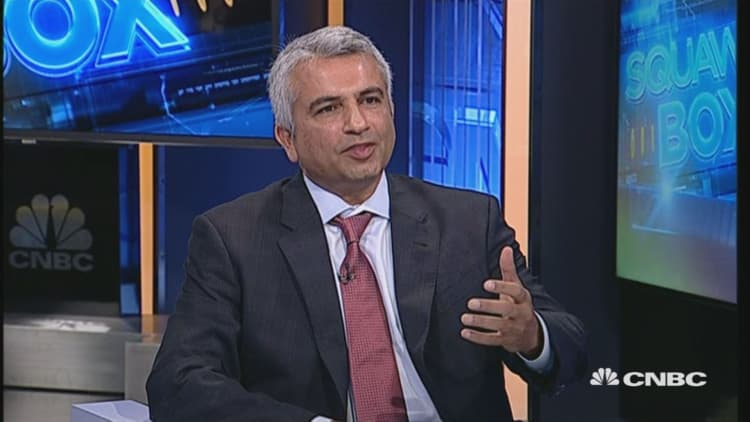
A Pimco managing director added his voice to the chorus of energy experts saying $50 per barrel is the magic number for crude oil on Wednesday.
Brent and WTI crude futures traded at around$49.10 and $46.35 respectively on Wednesday, having steadily gained since Friday on renewed speculation OPEC may yet freeze production.
"We think the right price over the next couple of years — we are pretty close to the right price — is in the fifties. That is where supply and demand gets balanced," Mihir Worah, Pimco CIO of real return and asset allocation, told CNBC.
WTI futures have gained around 11 percent since the start of the year, but remain sharply below the levels above $100 traded at prior to the massive commodities rout that began in July 2014.
Energy futures
Energy Futures
This year's rocky ride in crude prices has hinged on fears regarding the global supply glut, China's economic slowdown and the impact on energy demand and hints as to future trends in production.
OPEC members will hold an informal meeting in September, amid speculation that the Saudi Arabia-led group of major oil-producing countries will finally agree to limit production in order to boost global oil prices. This will come after recent discussions between Russia and Saudi Arabia in Vienna.
"As far as the Saudi-Russian OPEC meeting, we think it is just headlines. Both the Saudis and the Russians are pumping pretty much as much as they can. So freezing output is fairly meaningless," Worah told CNBC.
"But as we start getting above 50, then you start getting incremental supply in the United States. We think somewhere in the fifties is the right price for the next six to 12 months."
Malcolm Graham-Wood, the founder of HydroCarbon Capital and a well-known oil analyst, described $50 as the "magic" number for crude prices in his daily blog on Wednesday.
Emerging market-focused bank, Renaissance Capital, has said $50 crude is the ideal price for Russian energy companies and Egyptian Minister of Trade and Industry Tarek Kabil told CNBC in June that $50-$55 per barrel was the "sweet spot" for Egypt.
UBS said on Tuesday that it saw front-month WTI averaging $43.81 in 2016 and $57.00 in 2017. That is narrowly above consensus forecasts for $43.30 this year and $54.25 next and further above BNP Paribas predictions for $40 and $50, respectively.
Worah said the oil rout was likely over and that investors should consider the possible upward impact on global inflation.
"Inflation I think is actually the sleeper. A lot of people are ignoring it, but leading with the U.S., we are starting to see output gaps close; the commodity correction, as you said, and the oil correction is probably behind us. So this is something people are not worried about, but may creep up behind us in the next couple of years," he told CNBC.
Official data on Tuesday showed U.K. inflation came in higher than expected in July, gaining 0.6 percent on the year, compared with a 0.5 percent rise in June. The rise was in part driven by a decline in sterling, particularly against the U.S. dollar, since the U.K. surprised markets by voting to leave the European Union in a referendum on June 23.

Worah said the U.S. Federal Reserve must consider the impact of dollar strength on the global economy as it debates when to make its next interest rate hike. U.S. inflation came in unchanged in July, but a rise in industrial and housebuilding activity suggests a pickup in the economy that might allow the Fed to raise rates later in 2016.
"As far as the Fed is concerned, we think it might hike once this year. But whether they hike zero times or once this year is not that important. What is important is the Fed has realized that even as they hike, they have got to watch global financial conditions and the dollar," Worah told CNBC.
"They cannot let the dollar appreciate too much; it tightens global financial conditions to much, it is not good for the U.S., it is not good for anyone."
Inflation-protected bonds — known as TIPS in the U.S. — may be an attractive investment for those wishing to hedge against inflation, with prices low compared to most government bonds, Worah added.
"Most government bond yields are so low that people do not want to buy them; TIPS, because nobody is worried about inflation, are still relatively cheap. So we think that is quite an attractive investment right now," he told CNBC.

